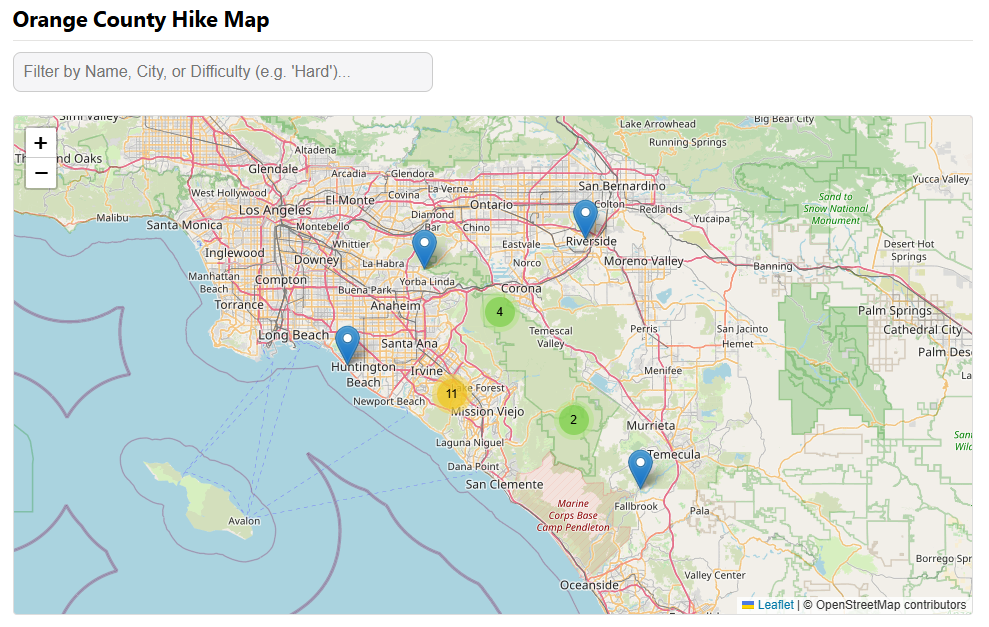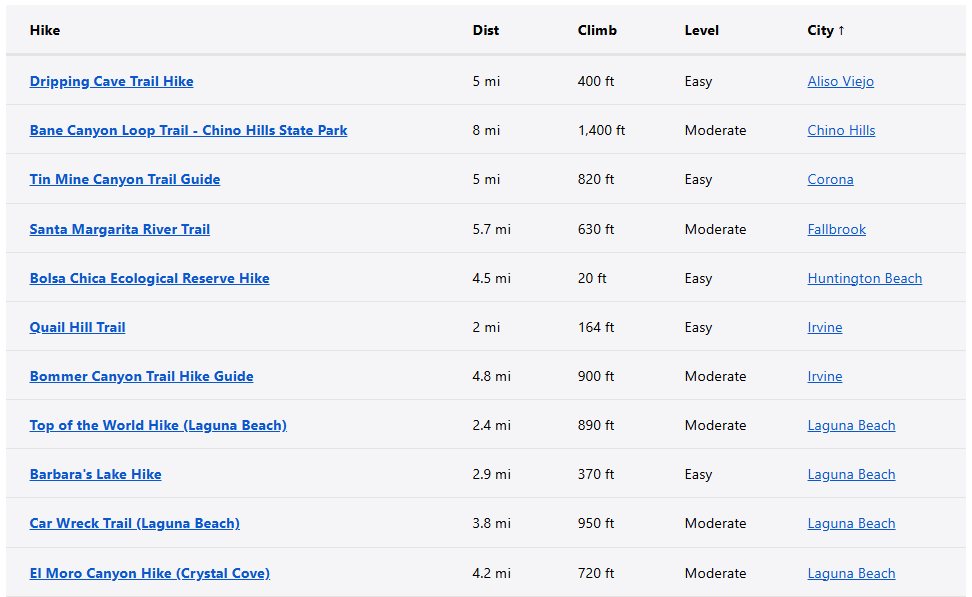1. Find a lookout point: There are plenty of romantic views around the region, from cliffs that overlook the glistening Pacific Ocean to quiet places where you can park your car and gaze over shining city lights.
Trails that sit above the ocean, such as Point Vicente in Palos Verdes, Corona del Mar’s Inspiration Point, Crystal Cove State Beach’s cliffside trails or the Dana Point Headlands, offer ocean vistas for light daytime strolls. Hilltop Park in Signal Hill is known for its epic city views above the twinkling lights. Further inland, check out the Mt. Rubidoux Trail just west of downtown Riverside, which showcases mountain ranges and the city below, but note that parking and the trial close at dusk.
2. Take a mini cruise: Southern California has several harbors and a vast coastline for special trips out on the water.
In Long Beach, check out Harbor Breeze Cruises’ historical tour of the Los Angeles Harbor, a 45-minute narrated cruise that includes the Long Beach skyline, the Queen Mary and wildlife hanging out in the harbor like sea lions or, if you’re lucky, gray whales.
In Newport Beach, you can charter your own Duffy boat for a more intimate cruise, packing wine and cheese or grabbing a meal from a dockside restaurant at Lido Marina Village.
In Dana Point, stop by the harbor’s “Love Wall” mural for a photo op with your own love before heading out on a cocktail cruise on Saturday or Sunday with Aventura Sailing. Captain Dave’s Dolphin & Whale Watching Safari will host sunset safaris for sweethearts and also offers romantic private charters, or join Dana Wharf Sportfishing & Whale Watching all weekend for cruises at sunset with a complimentary drink and treats.
3. Catalina Express now boarding: If you want a longer excursion, Catalina Express has charters from San Pedro, Long Beach, and Dana Point. Cruise around the island on a golf cart to take in the sights, or take some hiking shoes to traverse the scenic trails.
4. Romantic gondola ride: Taking a romantic trip to Italy might not be in the cards this year, but you can enjoy a gondola ride around Naples in Long Beach, Huntington Harbor, or Newport Beach in Orange County. Most companies offer Valentine’s Day specials, though some are already sold out, so you may need to be flexible and book an excursion on a different day.
5. Visit a lush garden: Botanical gardens can be beautiful places to explore, filled with flora and fauna of the region. Check out UC Riverside’s impressive garden located in the foothills of the Box Springs Mountains. The 40 acres on the east side of the campus feature four miles of trails, or just soak in the beauty of its 3,500 plant species from one of the benches.
Smaller botanical gardens can be found throughout the region, such as the Niguel Botanical Garden in Laguna Niguel. In the South Bay, check out the Manhattan Beach Botanical Garden in Polliwog Park or South Coast Botanical Garden in Palos Verdes.
6. Movie under the stars: Southern California is home to a handful of still operating drive-ins, including in the City of Industry, Montclair, Paramount and Riverside, that are easily found with an internet search and there are pop-ups that bring outdoor screens to even more communities. Or watch a romantic movie from the comfort of your own car at The Roadium in Torrance!
7. Soak in the beach scenes: There’s nothing more simple or romantic than a leisurely stroll on one of the region’s idyllic piers. Grab a meal from a local restaurant and head to the Malibu, Huntington Beach or San Clemente piers and find a spot to sit while watching surfers ride waves. The region’s other piers – from Hermosa Beach to Newport Beach and beyond – have eateries with a view or that can pack up food to go for a picnic in the sand.
Another beach-themed idea? Snuggle up with your loved one at a fire ring with the flames keeping you warm. Grab some S’mores fixings, a few hot dogs and watch the sun go down at any Huntington Beach stretch, Bolsa Chica or Aliso Beach in South Laguna, which have rows of fire rings available. Another popular place is Corona del Mar, but make sure you bring charcoal to burn, wood is not allowed.
8. Explore tidepools: Plan a great sunset stroll to explore sea creatures at local tidepools in Palos Verdes, San Pedro, Newport Beach, Corona Del Mar, Laguna Beach and Dana Point. You can look up the tide report at U.S. Harbors.
9. Shop an open-air market: Been limiting your time shopping inside? There are a few open air markets where you can stroll with your loved one to pick up something special, while at the same time supporting small businesses. Check out our Farmer’s Market post or our Shopping Center Guide to get ideas!
10. Snuggle in the snow: Get cozy with your loved one on a ski lift or maybe take a scenic chair lift ride, but make sure to bundle up. If you want a snowboard or ski getaway, be warned…with President’s Day the following Monday, it’ll be busy. Snow Summit, Bear Mountain, and Snow Valley are the local ski resorts.
Enjoy a day of snow play at Alpine Slide at Magic Mountain recreation park in Big Bear Lake if you want to avoid the resort crowds, but still want a thrill. There is a bobsled experience and snow play areas where you can tube down the hill.
If you’re not into playing in the snow, but want to enjoy the mountain views, check out Mount Baldy’s scenic lift rides, which take people to the Top of the Notch Recreation Area. It’s a 20-minute ride to 7,800 feet that has views all the way to the Pacific Ocean.





